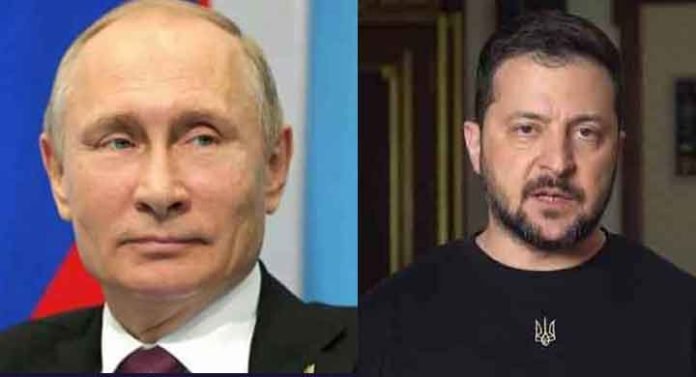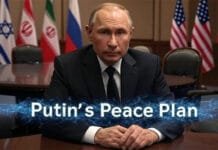Introduction : In a bold and optimistic move, Ukrainian President Volodymyr Zelensky has announced a significant plan to end the prolonged conflict with Russia. This declaration comes amidst ongoing tensions and the recent successful return of ten Ukrainian captives from Russian control. At a press conference in Kiev with Slovenian President Natasha Pirk Musar, Zelensky emphasized the importance of garnering global support for his comprehensive plan to achieve peace.
The Diplomatic Path to Peace
Zelensky’s strategy centers on diplomacy, with a keen focus on engaging international allies to back Ukraine’s vision for resolving the conflict. “It is very important for us to present a plan to end the war, which will be supported by most of the countries of the world,” he stated. This statement underscores Ukraine’s commitment to finding a peaceful resolution, relying on diplomatic channels rather than continued military engagement.
Current State of Negotiations
Despite Zelensky’s proactive stance, there are currently no active negotiations between Ukraine and Russia. Media reports indicate that public statements from both Zelensky and Russian President Vladimir Putin reveal a significant impasse. Ukraine has consistently maintained that peace talks can only proceed if Russia withdraws its troops from internationally recognized Ukrainian territories, including Crimea, annexed by Moscow in 2014.
Conversely, Putin demands that Ukraine cede its eastern and southern regions, now under Russian occupation, as a precondition for peace. This fundamental disagreement highlights the challenges facing any potential diplomatic solution and the complexities involved in reconciling both nations’ demands.
Recent Prisoner Exchange
One of the notable recent developments is the return of ten Ukrainian captives from Russian captivity. Zelensky proudly announced this achievement, emphasizing Ukraine’s ongoing efforts to bring back its citizens. Although he did not specify whether this release was part of a broader agreement involving Russian prisoners held in Ukraine, the gesture marks a significant humanitarian success.
Some of those released had been imprisoned since 2017, taken from regions in eastern Ukraine under Russian control. This exchange not only boosts morale within Ukraine but also underscores the persistent and pressing issue of prisoners of war, which remains a critical aspect of the broader conflict.
Background of the Conflict
The war between Ukraine and Russia has its roots in the annexation of Crimea by Russia in 2014, an act widely condemned by the international community. Since then, Russia has extended its control over additional Ukrainian regions, including Donetsk, Kherson, Lugansk, and Zaporizhia. The conflict has resulted in thousands of casualties and displaced many more, creating a dire humanitarian crisis.
Ukraine’s stance has been unwavering: Russia must vacate all occupied territories for peace talks to commence. However, Russia’s demand for Ukraine to surrender significant portions of its land complicates prospects for negotiations.
Zelensky’s Peace Plan: A Global Appeal
Zelensky’s peace plan aims to attract widespread international support. By rallying global powers and leveraging diplomatic ties, Ukraine hopes to put pressure on Russia to reconsider its aggressive stance. Zelensky’s approach includes addressing key issues such as territorial integrity, the return of prisoners, and establishing long-term peace and stability in the region.
His emphasis on a united global front is strategic, recognizing that international pressure and support could play a pivotal role in swaying the outcome of the conflict. The plan’s details remain under wraps, but its core premise revolves around diplomatic solutions and international cooperation.
Challenges Ahead
The path to peace is fraught with challenges. The starkly opposed demands of Ukraine and Russia form a significant hurdle. Ukraine’s insistence on the withdrawal of Russian troops from its territories clashes directly with Russia’s territorial ambitions. Furthermore, the lack of ongoing negotiations suggests a deep-seated mistrust and unwillingness to compromise on both sides.
Another challenge lies in maintaining international support. While many countries have condemned Russia’s actions, translating this condemnation into tangible support for Zelensky’s peace plan requires sustained diplomatic effort and coordination.
International Reactions
The global community’s reaction to Zelensky’s announcement has been cautiously optimistic. Many nations recognize the importance of ending the conflict but are wary of the complexities involved. Zelensky’s call for a united front has been met with supportive statements from several countries, although concrete actions remain to be seen.
The European Union, in particular, has expressed solidarity with Ukraine, emphasizing the need for a peaceful resolution that respects Ukraine’s sovereignty. The United States has also shown support, with calls for Russia to comply with international laws and withdraw from occupied territories.
Humanitarian Impact
The ongoing conflict has had a devastating impact on civilians. Thousands have lost their lives, and countless others have been displaced. The return of prisoners, as seen in the recent exchange, brings a glimmer of hope to affected families but also highlights the ongoing suffering.
Zelensky’s plan, if successful, could alleviate this humanitarian crisis. Peace would enable the rebuilding of war-torn regions, the return of displaced persons, and the restoration of normalcy for millions of Ukrainians.
President Zelensky’s determination to end the war with Russia through a diplomatic and internationally supported plan marks a significant step towards peace. While challenges remain, the emphasis on global cooperation and a united front offers a hopeful path forward. The recent prisoner exchange serves as a reminder of the human cost of the conflict and the urgent need for a resolution.
As the world watches, the success of Zelensky’s peace plan will depend on the ability to reconcile conflicting demands, maintain international support, and navigate the complex geopolitical landscape. The aspiration for peace remains strong, and with global backing, there is potential for a brighter future for Ukraine.














